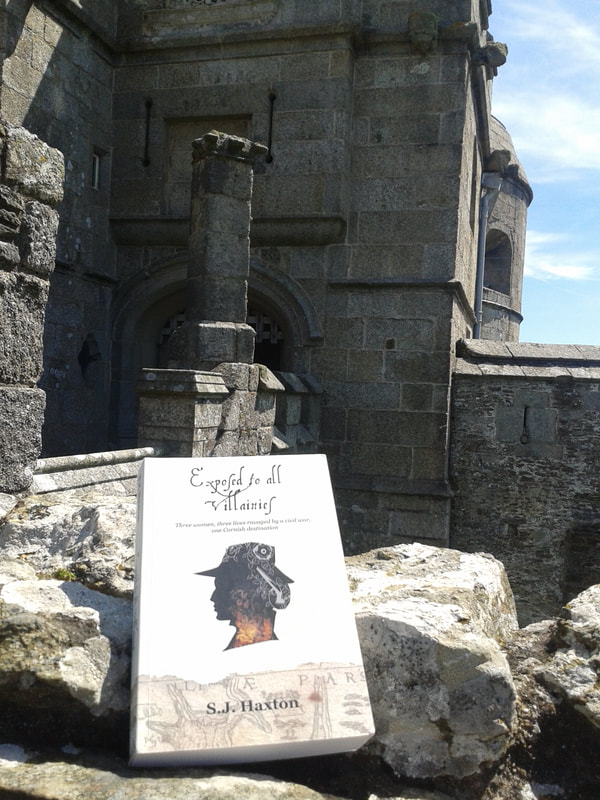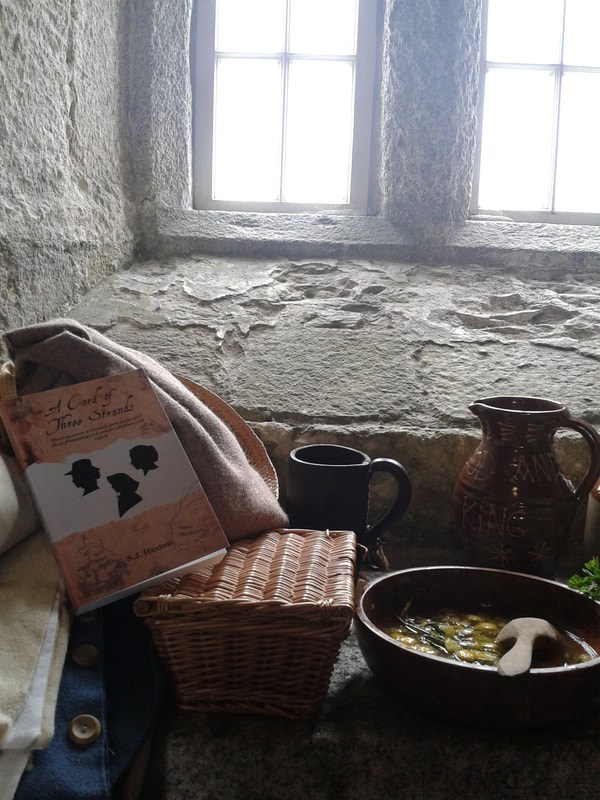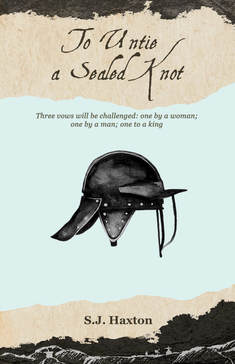A taste of the Pendennis Trilogy...
or for a taster of the work in progress go to my page 'Notes on things to come'!
The Castle's Prologue
On an August morning when a sea mist shrouds the Carrick Roads, muffling the cry of the gulls, look to the headland. In the moments before the hazy sun dries the dew or the mewling buzzard has flapped its lazy circle high into the air, a castle, squat and solid, rides the fog like a phantom. Pendennis Castle endures. It had stood for a hundred years before a bloody civil war between King and Parliament focused military minds on this Western fortress at the entrance to the river Fal. The granite walls survived both the war and a brutal siege lasting five months with barely a scratch; the citadel outlasted both monarch and Commonwealth, unstirred by the passions of politics, impassive, as it would stand through the reigns of the kings and queens to come.
However, the granite of Cornwall is remarkable, inspiring legends of glistening auras round isolated tors and mystic properties of stones that record the past then speak to those who would listen. In the ambiguity of the murky dawn light perhaps what seems to be the whisper of a stirring breeze are the stones of Pendennis murmuring their memories of an August long ago, when one thousand loyal hearts chose to come to Pendennis to make a stand for their King. Two hundred of these desperate souls were women and children. Three women’s voices echo still. One runs from her past, one fears for her present and the third has an uncertain future. The girl with eyes the colour of honey is older than her years and has come the farthest of the three. Her past will brighten her future but she does not know that yet. A wheaten-haired wife stands by her hero, busying herself with the distraction of a routine one hundred and sixty three days old. The wind catches her words of reassurance to the young and the sick but only the walls hear her weeping. There is a woman with hair the colour of a sunset. Constantly her slate grey eyes look to the north over the water. This harbour has felt many tides while she watches but still she looks for a wake, a dark head in the water and she listens for the howl of a hound. The castle holds these three women. They have all made their choices. They have more choices to make. Linger a while and hear their voices before the mist lifts and gulls’ cries make them indecipherable once more. |
In that our circumstances leave us so insecure, having been exposed to all villainies,
I deem it necessary to leave you this chronicle, my most cherished son, for none of us can now know what jeopardy might befall us.
Thus, I must tell you the circumstances of your birth, of the ties that bind you and of the precarious world you have entered, one turned upside down by civil war and man’s inhumanity to man. Though some will tell you your father was a pirate, he was not a murderer. In these lines will you discover where your trust might be placed and whom to approach with caution. Read my words and know that the woman who writes this values your life more than her own. These words are the truth and the truth will serve you well. You have Cornish blood in your veins and the sea in your heritage, indeed you were born under siege in Pendennis castle, on its wave-lapped promontory on the south coast of Cornwall. The beleaguered garrison was our home in the spring of 1646, our prison of choice, from March to August while elsewhere the nation bent to Parliament’s will. As the newssheets and the pamphlets railed about the ‘great malignants of the country’ defying Lord Fairfax’s summons to surrender, days and weeks turned into five long months. Rations, negligible to begin with, became pitiful. Eventually even the water in the wells turned foul. We endured all that … and the lice and fleas and the boredom … until at the end, there was but one barrel of salted horsemeat to feed nigh on a thousand souls. You were still a babe in arms then, too young to feel the cramps and evil lethargy that began to overtake even the strongest. Hester sustained you, against all the odds. Looking back, I do not know how the last company of King’s men and the pitiful following of wives survived, having occupied the high-walled fortress on the Fal though that sultry summer. It hardly seems possible that, near starved but unbowed, there were any of that ragged assortment of Royalists able to march from Pendennis Castle, reputations and pride intact. At 2 o’clock on a thundery afternoon, the sky overcast, the air prickling with tension, our nerves jangling in accord, Hester and I were some of the last to step through into a world newly made by generals and commissioners, where the King was a captive; where nothing could ever be the same. Colonel Lewis Tremayne’s soldiers, having the honour of being the escort to the Governor, were in the vanguard. We did not know whether we would ever see that most principled man again, Lewis, your godfather, or his wife, our dear friend Mary. She had been admitted to the infirmary, where we had to leave her because though we were very feeble, Hester and I had not succumbed and were expected to quit the fort. While I was determined to carry you out through the gates that had haunted our nightmares, I was too weak to manage for long. Hester took over as we, along with a miserably few women, tattered, bareheaded, straggled after the remnants of His Majesty’s once-proud regiments. There was a travesty of a guard of honour for the vanquished, men in blood red doublets two deep, either side of the dirt track from the drawbridge and down across the marsh. Hundreds of pairs of cold eyes marked our passage. Later we were to discover that, while one sympathetic gaze followed two unkempt, bareheaded women laden with a baby and some scant belongings, there was another individual in that crowd who, glimpsing a spectre from his past, made it his business that we would meet again. The flourish of trumpets’ fanfares echoing off the granite walls and the steady thud-thud, thud-thud, thump of the drum sustained our steps. The limp flutter of the Royalist’s colours, barely stirring against the flag-staffs in the heavy air, mirrored our mood as we made our way to Arwinch Downs where we were to be documented, described, enumerated and given a pass with permission to pursue our uncertain prospects. A lieutenant at his papers, beady-eyed and sharp like a rook, was untidily scrawling, sweat glistening on his brow. Another of the Parliamentarian officers stood beside him, looking less martial and quietly puffing on a pipe of tobacco as he watched, assessing each individual. The officer scrutinised first Hester then me. He never asked, only assumed that you were her infant, as well you might have been. Then he turned to me, “Your man: what is his name?” Tremenheere Sark. “His rank?” Captain. “What officer did he serve under?” Colonel Tremayne. “What’s his state – walking or sick?” Dead. The first lie is always the hardest. |
To bring a villain to justice will challenge sworn vows...
I loved a girl once; a lass with raven dark hair and eyes the colour of warm honey. I gave her a ribbon. Green it was, to tie up the silky hair that used to escape from her cap when we went a-walking along the banks of the river Torridge. I often wondered whether she still had the ribbon. Or, when I marched away, as did so many young men, did she tie it as a charm, like the tokens at the wishing wells, so she could forget me as the coloured threads faded. Years passed. Then, one day I saw that very same girl, unmistakable, alive, mingled amongst a thousand luckless souls, the rag-taggle Royalists who marched out of a Cornish fortress on the Fal. She did not see me. Once again, she slipped through my fingers. But from that moment I vowed that, come what may, I would seek her out. When I found her, when I was finally able to ask her about that little gift, it was not how I had I had planned, going down on one knee, like a knight of old. But I was on my knees as I pleaded with her to once again walk out with me. The Torridge was a way away, I said, but we would find another river bank instead, to sit together on a couch of soft mosses under dappled sunlight. She could not say if the ribbon had been lost, nor tell me if it was faded. I could not have heard her reply amidst the commotion of a neighbourhood responding to an alarm. Nonetheless I promised to buy her a new one - if she would just give me a sign. As I held her body close, I begged her not to leave me, this woman who should be my life’s partner. She did not answer, lying limp in my arms, her blood staining my breeches and the scrubbed floor beneath us while the mocking laugh of a villain and the whimpering of a child were replaced by the clatter of hooves that faded into the distance. |



